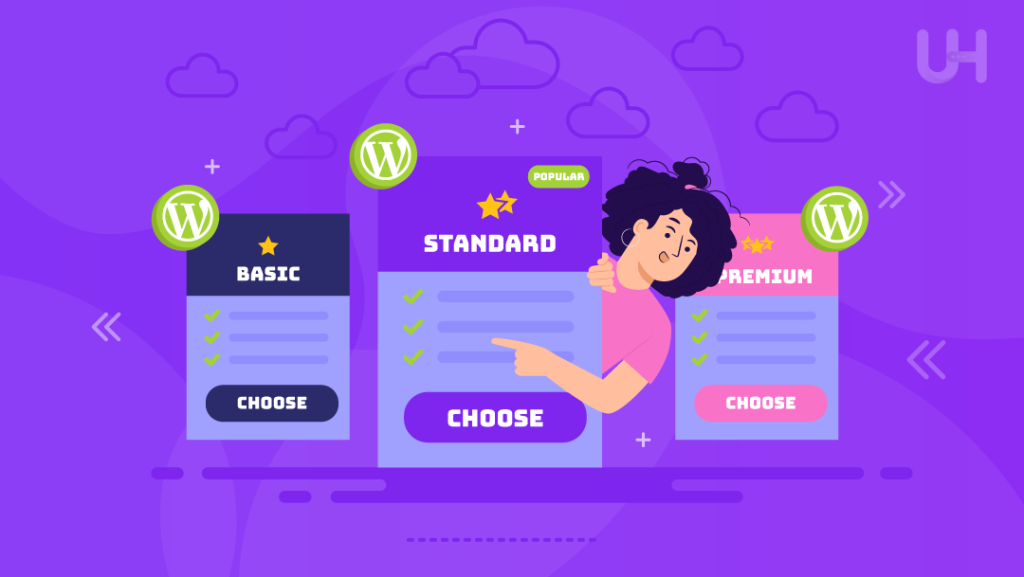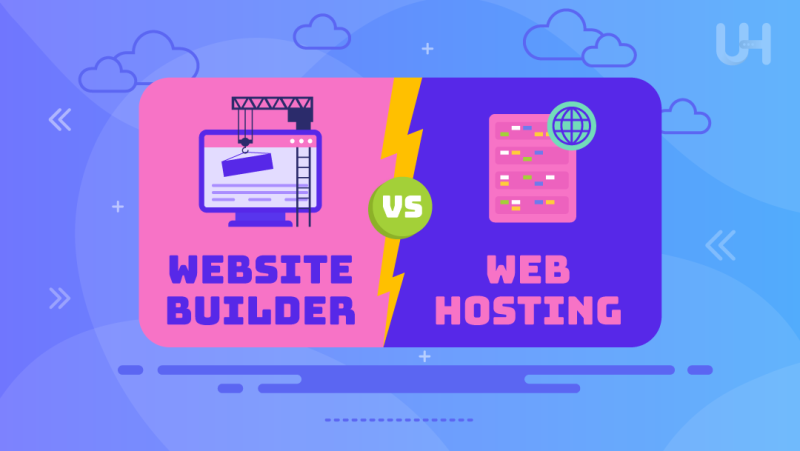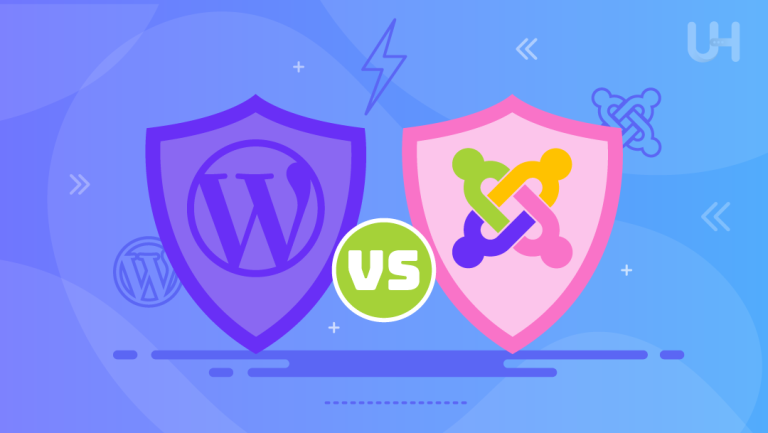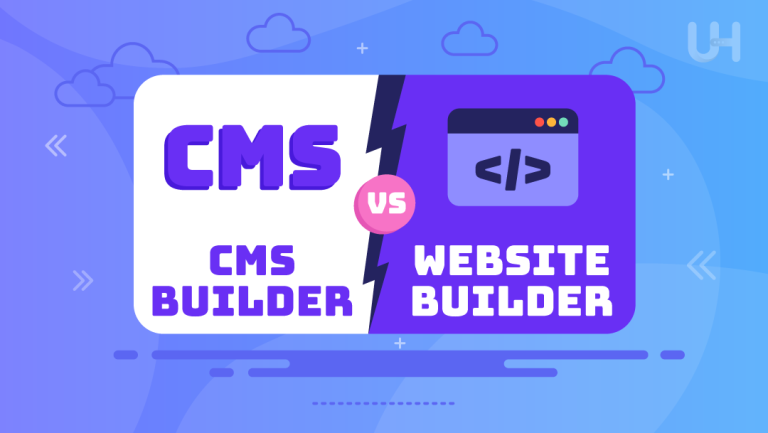Today, a person needs to have an online presence of any type-be it is a business, personal blog, or creative project. When one decides to create and maintain a website, one typically has two options: either website builders or web hosting.
A Website Builder is all-in-one platforms that enable the easy creation and launching of a site, pre-designed templates with drag-and-drop tools, often providing hosting services, as well. On the other hand, Web Hosting is the act of renting server space to store the files of your website, letting you use other tools or content management systems (CMS) for more control and customization, requiring some technical knowledge, of course.
We compare the options for features, costs, and benefits to help you determine the best fit for your needs in this blog.
What is a Website Builder?
A website builder is an online platform that makes it easy for almost anyone to create and manage a site. These tools offer a non-technical user-friendly interface, allowing almost anyone to design, build, and deploy a professional-looking website without having to write any code. Website builders usually have a variety of templates and customizable design elements to assist users in creating a site to meet their specific needs.
Popular website builders include:
Wix: Famous for its highly customizable interface and a very large library of templates. It lets users drag and drop multiple elements to easily create a customized site. Also, it comes with features such as apps and integrations that make it work even better.
Brizy: Known for its user-friendly drag-and-drop interface, Brizy makes it simple to create professional-looking websites without any coding skills. It offers a wide range of pre-made templates and design blocks, allowing users to build responsive sites quickly and easily. Brizy is available both as a WordPress plugin and a cloud-based platform, giving flexibility in how and where you build your site. It also includes features like global styling, marketing integrations, and white-label options for agencies and freelancers.
Squarespace: It’s all about clean, contemporary designs with a heavy emphasis on style. Squarespace offers professional templates in many formats that are both desktop and mobile-friendly, plus features like built-in blogging and e-commerce functionality and analytics.
Weebly: This drag-and-drop builder is pretty intuitive for those new to web building, offering essential functionality for small businesses and websites- even e-commerce capabilities and some SEO tools.
Neo: An AI website builder that can generate your website in seconds using a single prompt, without any coding or design skills needed. Neo comes with a free domain and a buisness email.
Ucraft: Renowned for its professional design options, the Ucraft website builder offers an intuitive drag-and-drop editor for easy site creation. It includes powerful e-commerce tools, multilingual support, and integrations, making it ideal for businesses and agencies.
Key Features
- Drag-and-Drop Interface: The most important advantage of website builders is their drag-and-drop interface. This feature lets the user add and arrange elements like text, images, buttons, and videos on the pages by simply dragging them into place. It is an intuitive approach that doesn’t require any coding skills, making the design process more accessible.
- Pre-Designed Templates and Themes: Many website builders have pre-designed templates and themes for creating a website. They have many of them designed to different industries and purposes, like portfolios, blogs, and online stores. The users can modify them to represent the brand identity through colors, fonts, and layouts.
- Built-In Tools for SEO, Analytics, and E-Commerce: Most website builders include integrated tools that help users optimize their sites for search engines, track website analytics, and manage online sales. This built-in feature streamlines website management and there is no need to use additional plugins or external services.
- Hosting Included: Webflow maintenance includes hosting as part of the website building package. There is no extra hosting plan, and no setting up server configurations. Everything has to do with hosting will be taken care of by the website builder: uptime, security, and server configurations.
Pros
- Ease of Use: The makers of website builders have ensured ease of use to allow even someone with little technical knowledge to set up a perfectly functional and presentable website. The drag-and-drop interface makes the design work easier, along with pre-designed templates.
- All-in-One Solution: Website builders allow for a completely integrated solution, usually providing website development, hosting, and sometimes domain name registration in a single package, which simplifies the setup and reduces the administration of multiple providers.
- Quick Setup: The pre-designed templates and the built-in tools enable users to set up their websites quickly, which can go live immediately. This is particularly suitable for individuals who want to launch their site without much delay.
Cons
- Limited Customization: While website builders provide a wide range of design options, they are often more limited than more advanced solutions. Options for customization may be limited to what the builder provides, which can be a drawback for users who want more control over their site’s appearance and functionality.
- Less Control Over Hosting: Because website builder handles hosting, users cannot control server performance and configuration. Therefore, those who have particular hosting needs or require advanced management capabilities of server operations may be limited.
- Potential for Higher Long-Term Costs: Indeed, website builders usually have smaller short-term investments; however, recurring subscription payments could add up to a rather larger amount with time. Not to mention potential add-ons of premium features and even increased storage, unlimited bandwidth may cost much more in the long run and is, hence, more expensive.
By understanding these aspects of website builders, you can better assess whether they align with your website needs and goals.
Looking for an Easy Way to Create Your Website?
If simplicity and quick setup are what you need, a website builder might be the perfect choice. With a user-friendly interface, you can get your website up and running in no time. Explore the Ultahost Website Builder and start building your site with ease today!
What is Web Hosting?
Web hosting provides a means to host a personal or organization’s website by holding its files in a server; it then grants access to visitors through the internet. Web hosting, in fact, means the rental of space on a server to accommodate your website’s data: such as HTML and CSS, pictures, and scripts. In that regard, a web hosting company guarantees your site’s accessibility around the clock to anyone accessing it.
There are different types of web hosting, all suited to various needs and levels of technical know-how:
Shared Hosting: This is the most elementary and inexpensive kind of hosting. In Shared Webhosting, several websites use the same resources on a given server, that is, the CPU, memory and storage. It’s affordable and quite easy to establish, but performance may be impaired by the actions of other sites on the same server.
VPS Hosting: In this type of hosting, a virtualized server environment is provided within the framework of a physical server. It is different from shared hosting; in VPS, dedicated resources are used, with more control over the server environment, making it suitable for growing websites with increased traffic or specific requirements.
Dedicated Hosting: Dedicated server hosting refers to the complete leasing of a server for your websites, and hence the best level of control and performance is its benefit. It is ideal for large websites or very high-traffic websites but at a cost that is more than its counterparts and expertise to manage it is required.
Key Features
- Server Space and Bandwidth: Web hosts allocate server space to store your website files. Bandwidth is the amount of data that can be transferred between your website and its visitors. Hosting plans differ with respect to amounts of storage and bandwidth limits; this affects the performance and loading times of your site.
- Domain Management: Most web hosting services also provide domain management features. With it, you can register, transfer, and manage your domain names right from within your hosting account. It’s centralized for the management of domains and hosting. It would make DNS configuration and renewals much easier.
- Email Hosting: Most web hosting providers also offer email hosting services, through which you can create and manage your custom email addresses associated with your domain name, such as [email protected]. This gives you professional email communications and allows you to work with popular email clients.
- Customizable Options for Website Building: With web hosting, one can make use of many types of content management systems (CMS) and other website-building tools. For example, WordPress, Joomla, or Drupal may be installed for developing and managing the site with various options and functions for customization.
Pros
- Greater Control: Web hosting provides more control over your server environment and website management. Depending on the type of hosting, you can configure server settings, install custom software, and manage security settings according to your specific needs.
- More Flexibility: Hosting services offer greater flexibility in terms of website design and functionality. You can choose from various CMS platforms, install plugins, and integrate third-party services to tailor your site to your preferences.
- Scalability: Web hosting solutions, especially VPS and dedicated hosting, allow for easy scaling as your website grows. You can upgrade your server resources or switch hosting plans to accommodate increased traffic and additional features.
Cons
- Requires More Technical Knowledge: Compared to website builders, web hosting often requires more technical expertise. Managing server settings, troubleshooting issues, and performing updates may require a higher level of knowledge or the assistance of a web developer.
- Separate Purchases for Domain and Website Builder: Unlike website builders, which often include domain registration and website creation tools, web hosting typically involves separate purchases for domain names and website-building software. This can make the setup process more complex and potentially more expensive.
By understanding the various aspects of web hosting, you can better assess whether it aligns with your website needs and goals, especially if you require more control, flexibility, and scalability for your online presence.
Ready to Build Your Website?
Now that you’ve explored the differences between website builder vs website hosting, it’s time to take the next step. If you’re looking for flexibility, control, and scalability, consider a reliable web hosting provider to support your website’s growth.
Comparing Features
Website Builder vs Web Hosting: Ease of Use
Website Builder: Website builders are designed with ease of use in mind, featuring user-friendly interfaces that allow you to create and manage your website without needing any coding skills. These platforms provide drag-and-drop functionality, pre-designed templates, and simple customization options. Therefore, making them ideal for beginners and those who want to quickly set up a site without technical complications.
Web Hosting: Web hosting generally requires more technical knowledge, particularly when using platforms like WordPress or managing server settings. While web hosting itself does not dictate how you build your site, the level of ease or difficulty will depend on the website-building tools or content management systems (CMS) you choose. Setting up and maintaining a site on web hosting often involves a learning curve and may necessitate additional technical support.
Website Builder vs Web Hosting: Design and Customization
Website Builder: Website builders offer a range of pre-designed templates and themes that provide a quick start to building your site. While these templates are easy to use and customize to a certain extent, they can be restrictive if you need more unique or advanced design elements. Customization is generally limited to what the builder allows, which can be a drawback if you have specific design requirements.
Web Hosting: Web hosting provides greater flexibility when it comes to design and customization, especially when using a CMS like WordPress. With web hosting, you can access a wide array of WordPress themes and plugins, or even develop custom designs from scratch. This level of control allows for more personalized website features but may require more effort and expertise to implement.
Website Builder vs Web Hosting: Maintenance and Support
Website Builder: Most website builders include built-in support and maintenance as part of their service package. This often includes automatic updates, security patches, and customer support to help you resolve issues. The convenience of having maintenance handled by the service provider reduces the need for you to manage these aspects manually.
Web Hosting: With web hosting, maintenance and support are generally your responsibility or that of a hired professional. While some hosting providers offer support services, tasks like updating software, managing security, and troubleshooting issues will usually fall to you or your web developer. This requires a greater level of involvement and technical knowledge to ensure your site runs smoothly.
Website Builder vs Web Hosting: E-commerce Capabilities
Website Builder: Many website builders come with built-in e-commerce features that allow you to set up an online store quickly. These features typically include product management, shopping cart functionality, payment processing, and inventory tracking. Built-in e-commerce tools are designed to be easy to use, making them suitable for users who want to start selling products online with minimal setup.
Web Hosting: E-commerce capabilities on web hosting are often achieved through third-party plugins or custom development. For example, with platforms like WordPress, you can use plugins like WooCommerce to add e-commerce functionality to your site. This approach offers more flexibility and customization options but may require more effort to set up. For businesses looking to establish an online presence, investing in robust web development services can enhance user experience and drive conversions
By comparing these features, you can determine which option—website builder or web hosting—best suits your needs based on ease of use, design flexibility, maintenance requirements, and e-commerce capabilities.
Comparing Costs
Website Builder vs Web Hosting: Initial Costs
The initial costs for a website builder are generally straightforward and encompass both website creation and hosting services within a single subscription fee. Most website builders offer various pricing tiers that might include a free domain registration for the first year. This all-in-one package simplifies the cost structure and makes it easy for users to start building their site with a single payment. This convenience can be appealing for those who want to avoid the complexities of managing multiple services.
In contrast, with web hosting, the initial costs are more segmented. Users need to separately purchase a hosting plan, which can vary from shared to dedicated hosting depending on their needs. Additionally, domain registration is often a separate expense, not included in the hosting plan. If a content management system (CMS) like WordPress is used, there may be additional costs for premium themes or plugins. This separation of costs can lead to a more fragmented financial setup but allows for more tailored service options.
Website Builder vs Web Hosting: Long-Term Costs
Over time, website builders can present higher ongoing costs due to their subscription-based pricing models. Monthly or annual subscription fees may increase if you upgrade to higher-tier plans to access additional features or more storage. Additionally, advanced e-commerce tools and extra storage often come with extra fees, which can accumulate as your site grows. Domain renewal after the initial free period also adds to the long-term costs.
On the other hand, web hosting can potentially offer lower long-term costs, particularly if you opt for a basic hosting plan and manage your site efficiently. However, users should consider potential additional expenses, such as domain renewal, premium themes, and plugins, which can contribute to overall costs. Maintenance and management expenses, including hiring developers or purchasing support services, might also add to the long-term financial commitment.
Hidden costs associated with website builders can include charges for premium features that go beyond the basic offerings of your subscription plan. For instance, advanced e-commerce capabilities or additional storage might come with extra fees. Users may also face overage charges if they exceed their plan’s limits on storage or bandwidth. Domain renewal fees, which kick in after the first free year, are another potential hidden cost to be aware of.
For web hosting, hidden costs may involve additional charges, which can be required if you need specialized or extensive assistance. Enhanced security services, such as SSL certificates and DDoS protection, often come at an extra cost and might not be included in the basic hosting plan. Backup services, crucial for data protection, might also be an optional add-on with its own associated fees. Maintenance, including regular updates and troubleshooting, might necessitate hiring a developer or purchasing additional tools, which can further increase overall expenses.
Choosing the Right Option for Your Needs

Assessing Your Goals and Requirements
Choosing between a website builder and web hosting hinges on understanding your specific goals and needs. If you’re establishing a small business, a website builder might be the right choice due to its ease of use and all-in-one functionality. Builders like Wix or Squarespace offer a range of professionally designed templates tailored for businesses. It includes features for contact forms, service pages, and integrated social media links. These platforms can quickly create a polished online presence without the need for technical expertise.
For personal blogs, a website builder provides a user-friendly environment with built-in blogging tools and themes. Platforms like WordPress or Blogger offer simple interfaces and essential features like post scheduling, comment management, and media uploads, making them ideal for content creators who want to focus on writing rather than website management.
If you’re launching an e-commerce store, web hosting might be more suitable due to its flexibility and scalability. Web hosting services allow you to use platforms like WooCommerce or Magento. It offers extensive customization options for product listings, payment gateways, and inventory management. This is particularly beneficial if you anticipate needing advanced e-commerce features or custom functionalities.
Additionally, consider your technical skills and willingness to manage hosting. Website builders require minimal technical knowledge, as they handle hosting, maintenance, and support. This makes them ideal for users who prefer a hassle-free setup. Web hosting, however, demands a higher level of involvement. You’ll need to manage server settings, handle updates, and possibly troubleshoot issues. It may require some technical expertise or the assistance of a web developer.
Budget Considerations
Budget plays a critical role in determining whether a website builder or web hosting is the better choice. Website builders typically have a clear and predictable pricing structure, with subscription plans that include hosting, a domain (often for the first year), and support services. This can simplify budgeting, as you’re generally paying a single fee for all necessary services. However, be mindful of potential additional costs, such as fees for premium features, extra storage, or advanced customization options that may not be included in the basic plan.
Web hosting can initially appear less expensive, but the costs are usually more fragmented. You will need to budget separately for hosting, domain registration, and potentially a website-building tool or CMS. For example, while many hosting providers offer low-cost plans, you might need to purchase premium themes or plugins for added functionality. Long-term costs with web hosting can also vary based on your needs for technical support, security features, and backup services.
When comparing cost of website builder and hosting, it’s important to consider both the initial setup and long-term financial commitments. Website builders offer simplicity in pricing, while web hosting offers flexibility but requires more careful budgeting for ongoing expenses.
Future Growth and Scalability
Future growth and scalability are essential factors to consider when selecting between a website builder and web hosting. Website builders provide a straightforward way to scale within their platform. They offer various plans with increasing levels of features, storage, and bandwidth, allowing you to upgrade as your website grows. This approach is convenient for users who prefer to stay within the same ecosystem and avoid complex technical upgrades. However, the scalability of website builders may be limited by their built-in customization options. As your website needs evolve, you might find yourself constrained by the limitations of the builder’s templates and functionalities.
In contrast, web hosting offers greater flexibility and scalability. With web hosting, you can easily upgrade your hosting plan to accommodate increased traffic or resource needs. You have the option to install additional plugins and make extensive customizations to adapt to your growing requirements. This level of flexibility is ideal for websites that anticipate significant growth or require specific functionalities. However, this flexibility comes with a trade-off: managing these changes often requires more hands-on involvement and technical expertise.
Ultimately, the choice between a web hosting vs website builder should be guided by how you anticipate your website evolving over time. If you expect significant growth or need advanced customizations, web hosting provides a more scalable solution. If you prefer a simpler setup with predictable upgrades, a website builder might be the more suitable option.
Conclusion
Deciding between a website builder vs web hosting depends on your needs. Website builders are easy to use and ideal for simple sites with minimal technical involvement. Web hosting offers more flexibility and customization for complex or growing sites but requires more management. Consider your budget, technical skills, and future needs to choose the best option for your website.
If you’re considering moving your existing website to a new platform, Ultahost offers a Free Website Migration service to make the transition seamless and stress-free. Take the next step confidently, knowing that expert support is just a click away!
FAQ
What is a website builder?
A website builder is a tool that allows you to create a website easily by using a drag-and-drop interface and pre-designed templates and integrated hosting, without needing coding skills.
What is web hosting?
Web hosting provides the server space and technology to store and serve your website on the internet. It requires separate tools for website building and more technical management.
Website builder vs. web hosting: What’s the difference?
Website builders are user-friendly and all-in-one, including hosting. Web hosting offers more customization and flexibility but requires separate purchases and technical management.
Which is better for a personal blog?
For a personal blog, web hosting is usually the better choice. It offers more flexibility, allowing you to use powerful content management systems like WordPress that are specifically designed for dynamic content.
Can I use a website builder for e-commerce?
Yes, many website builders support e-commerce, but web hosting may be better for advanced needs and scalability.
Are there hidden costs?
Website builders may have extra fees for advanced features. Web hosting might have hidden costs for support, security, and backups.
How do I choose the right option?
Consider your website goals, technical skills, budget, and future growth. Website builders are simpler; web hosting offers more flexibility and customization.












